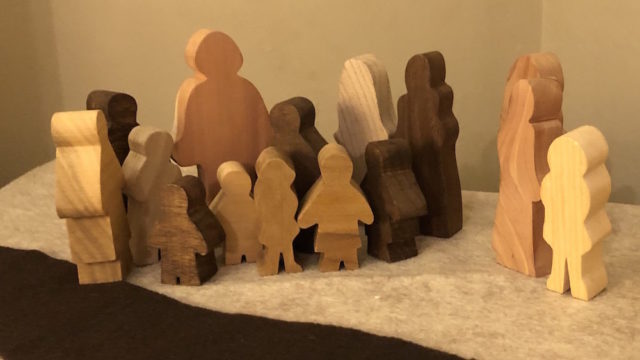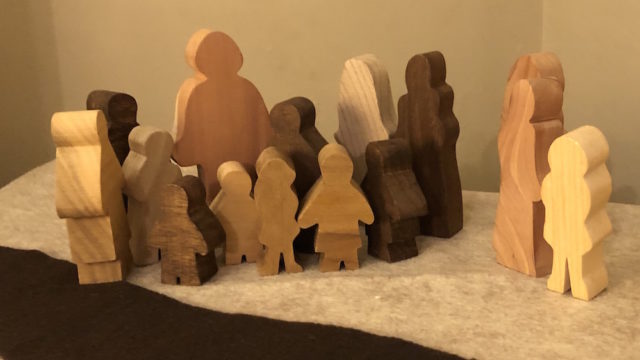

Authorship is credited to Melinda Wenner Bradley (West Chester Meeting), Quaker Religious Education Collaborative
The intensity of the election cycle is an experience both for adults and for the children and youth in our families and communities. Depending on their age, preschoolers to teens may be aware of the anxiety in the adults around them — and experiencing their own anxiety about the outcome of the election in November.
The 2016 presidential election is an event etched into my parenting memories. I remember navigating with my children the responses, questions, and feelings on election night and in the days that followed. The nine year-old in our family reluctantly went off to bed on election night after telling me that depending on the result, I should wake him up; “I don’t want you to be alone,” he said. Whether he was picking up on my distress as poll results rolled in, or projecting his own worries, the gravity of the moment was not lost on a fourth grader. This year, my children are old enough to volunteer and vote, and their concerns are different — connected to the future of their young adult lives.
The 2024 election cycle has been divisive and fractious, putting stress on relationships in families, with friends and neighbors, in communities. It’s challenging to know that our young people are watching the behavior of the people who seek to lead, but that behavior is characterized by incivility and a lack of integrity. Whatever your political leadings are, the messages can be confusing at best and engender a lack of confidence in our political system and government leadership at worst.
The impact of the last three election cycles on the civic lives of American youth and young adults is real. A 2024 report from the Springtide Research Institute found that among young people ages 13-25, members of “Gen Z,” conversations about politics focused on the issue of care, not partisan politics. More than half of those surveyed — a growing group of eligible voters in the US — do not identify with a political party, and many do not trust political institutions, including the presidency.
No surprise, the report, “Cultivating Care: How & Why Young People Participate in Civic Life,” reveals the deep concern these youth and young adults have for issues like education, the economy, and climate change. Young people in the study who reported that politics is relevant to their everyday lives also felt knowledgeable about social issues and hold an organized set of beliefs that help them make sense of these issues and engage in behaviors that support their beliefs. From the report: “Religion helps to motivate and interpret, clarifying for young people what to care about and how. Many reflect critically on how religious and spiritual beliefs intersect with political stances that might undermine freedoms.”
Core values, religion and spirituality, and relationships all provide a framework for how young people interpret social issues. How are we engaging with their concerns, fears, hopes, and questions in our meeting communities? From Springtide: “Parents, teachers, and other trusted adults play a crucial role in cultivating young people’s civic care.” Trusted intergenerational relationships — like those we can nurture in a meeting — support young people to think critically and discuss difficult topics with integrity. In our current societal climate, parents and caregivers of young people are holding so much! How can we hold them, and find ways to be together in spirit and community during the days ahead?
On Sunday, October 20, PYM Youth Programs staff will host an intergenerational community event bringing together families to explore how we approach differences and conflict, alongside Friends’ testimonies of integrity and peace. The program is designed for this time before the November election, hoping to create a space for families and children to experience that they are part of a wider community standing with courage for integrity, peace, and justice when there is rising concern about election violence and societal conflict. Please let families in your meeting know about this event for them! All are welcome, including grandparents and families in Friends schools.
This afternoon program, Peace Begins with You: A Gathering for Children & Families, will be co-facilitated by Dwight Dunston, who Friends may remember from his work as part of City Love at Annual Sessions in 2020, and as a speaker on the “Fox Forward” panel this summer. Dwight is a Philly based educator, hip-hop artist, and activist with deep experience in facilitating Kingian Nonviolence programs and working with children. Dwight will facilitate both an intergenerational exploration of integrity and peace, and worship sharing for adults. The children’s program will also explore how queries help us to stand in truth and take care of one another in community.
Knowing that the children and youth in our care are watching what we model with our responses, we can start with listening to them and providing information as needed, alongside the reassurance of our presence and care. Shared below are resources for talking to children and teens about the upcoming election:
- Blog: “Guidance for Speaking to Kids About the Election” (Child Mind Institute, September 2024)
- Two earlier articles that remain relevant and helpful:
- “How to talk to kids about election 2020 and the ugly side of politics, according to experts” has solid ideas for talking with younger and older children.
- “17 Tips to Steer Kids of All Ages Through the Political Season” from Common Sense Media breaks down ideas by age and school level.
- Study: “How To Talk about Politics with Young People” (Springtide Research) includes a collection of responses from young people (ages 13-25) about what adults could do to make them feel like they can talk about politics together.
- News for Kids: The Week Junior is a news magazine specifically for children ages 8 to 14. Online resources include, “How to talk to kids about Election 2024“
- Parent/Caregiver Event: The Meaning of Kamala Harris – for Our Kids and Ourselves (Embrace Race) October 10 online program (8:30 ET) exploring: “What does the upcoming presidential election and its historic identity choice mean for kids and their adults? Separate from the huge questions of democracy and policy differences at play, how and to what extent do Kamala Harris’ racial and gender identities, and the representation of those identities, matter?”
- These picture books help to explain and normalize the election process and voter responses to it; the first three listed here can also be found on YouTube as read alouds:
- V is for Voting by Kate Farrell
- Duck for President by Doreen Cronin
- Sometimes People March by Tessa Allen
- Collection: 10 Picture Books About Elections and Voting
- A Word on Protests, for Young Children An educator shared this short film with her Kindergarten class on YouTube during the protests that followed George Floyd’s murder in 2020. If protests follow the election in November, it has language that might be reassuring for young children to hear or helpful for parents to use.
As with any hard conversation, it may be tempting to avoid the topic of politics and the election, believing that children are too young or youth are not interested in talking about it. Our responsibility to them says otherwise — That engaging children and youth helps them to process information they are hearing on the playground or news and form a commitment to the civic duty to vote and participate in the democratic process. There is also the opportunity to practice critical thinking about messaging and participate in activism that encourages belonging. The Child Mind Institute reminds us: “Elections are always good times to model fairness, graciousness and resilience.” In our meeting communities, let’s consider how to support young people and their families in this time.